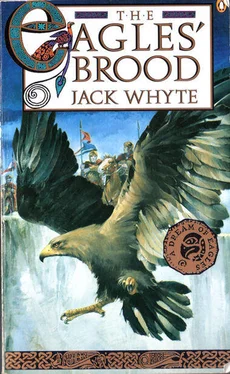That brought him swinging round to face me, his eyes blazing, even in the moonlight. "What honour? My mother and your father combined to deprive him of all honour!"
I bit back my own angry retort, forcing myself to take a deep breath and hold it before speaking again. Then I chose my words carefully, wishing to give him no cause to fight me, and willing my voice to sound calm and reasonable.
"Ambrose, we have no cause to believe that...and the evidence would seem to indicate that it's untrue, in any case."
"Evidence!" His voice shook with scorn and wounded fury. "What evidence? What need is there of evidence? It is evident—sublimely evident—that my mother was depraved. Her own actions condemn her to anyone with ears to listen to the story of her infamy...."
He subsided into silence and I drew another deep breath, and now when I resumed he did not attempt to interrupt me.
"Listen to me," I went on in a much gentler voice. "I have been thinking deeply about that since I first saw you and realized what must have happened..." I paused, aching with the need to help him. "You have said you believe my tale. Well, if you do, then you must believe all of it. It's not good enough simply to hear the parts you want to hear. The whole deserves examination, not merely the parts."
"That's ridiculous." His voice was the distillation of bitterness. "What is there to examine? To hear it is to believe it at first draught. The woman—my...my mother—was a faithless wanton. Without her faithlessness, there would have been no tale to tell."
"No, Ambrose, you are wrong. That is not so." My heartbeat had surged suddenly, for I had seen his error, and its incongruity, even as he spoke the words, and now I hurried on, trying to articulate die thought that had leaped into my mind. "Without my father's recognition of her—by sheer blind chance —in that marketplace on his way to embark for Italia, there would have been no tale! My father believed until that point he had merely been dreaming, and there is no sin or guilt in dreams. He would have thought no more of his dreams, and the cause of your father's attack upon him while he slept would have remained a mystery, unfortunate and inexplicable. Only that single sight of the woman, by mischance, changed everything for ever. And had that not occurred, your life would not have changed."
"What...what do you mean?" His expression now was one of uncertainty, triggered perhaps by the arrangement of my words. I held up my hand in an appeal for time to complete what I was thinking, for I was using words now that had not occurred to me before this moment.
"We will never know the exact truth of what your mother thought, or what motivated her to act as she did," I said. "But consider this, if you will.... " My thoughts were outstripping my abilities to voice them. "Suppose...just let us suppose, ludicrous though the thought might seem at this moment, that your mother had a deep and genuine love for the old man. He had no son. Is that not so? Only a single daughter in her teens. You were his only son?" He nodded, his face twisted in perplexity. "Then let us suppose also that his age made it impossible for him to father a son. Not to attempt the feat, you understand, but to achieve it. For all we know, he and his wife could have been trying for years. Will you agree to that?"
He nodded, yet I could see he was baffled and still angry. I rushed on with my thought before he could speak. "Now, consider this. A virile, healthy soldier of noble birth, dreadfully wounded in the neck and face but otherwise complete and whole, comes to live in their house. This man is in constant pain from his injuries and his face is heavily bandaged. For much of the time, he is effectively blind, deaf and mute, and is heavily drugged against his pain at all times. He never sees, and seems unaware of, anyone in the household, but is under constant surveillance by physicians, the household staff, the daughter of the house—we know that because my father spoke of her—and therefore, it would seem probable, also by the mistress of the house.
"Now suppose again that somehow, perhaps by overhearing the physicians speaking among themselves about their charge, she learns that the soldier is sexually healthy, purging himself of seed in dreams at night as strong men will in celibacy. Might she not see that, somehow, as a cause for regret, a waste? I mean this seriously, Ambrose, and who can ever tell what thoughts go through the mind of another? And might she not then think of it for long weeks, during which the soldier's strength increased although his wounds did not improve...and might she not devise, in her love, or in her desperation, a means of using—borrowing, one might say—the natural, outflowing strength of one man, all unknown to him since he is drugged at all times, to benefit the flagging strength of another whom she loves?"
Now he did interrupt me. "Wait! Are you implying that my mother might have done what she did out of love for my father?"
I nodded my head. "Yes, I am."
"That is obscene! I've never heard the like—"
"No more have I, but it makes as much sense as the other! Think about it, man! This was no ordinary lust. There was nothing personal in what my father dreamed. It was a vision remembered, nothing more! The hazy recollection of a nocturnal image. To believe your mother capable of such mechanical impersonality, such mindless, self-destructive and aggressive lust, would be to brand her truly monstrous, and I doubt that she was anything like that."
"This is insane! I've heard enough. Thank you for your attempt to salvage my mother's worthlessness, although I know not what you hoped to achieve."
"No, damnation! Listen to me, for this is as new to me as to you and L don't know, either, what it means, but it seems reasonable to me. Ask yourself what I have to gain from this. Your mother means nothing and less than nothing to me. Why should I try to improve your memories of her?"
"Aye, there's the truth!" His voice was grating. "The woman you are trying to describe would have been capable of great love, is that not so? Great enough to abandon a baby? The fruit of her perfidy and infidelity!"
"Or the reminder of her failure!" His face froze. "Can't you see it?" I asked. "Can't you see what it would have meant to her? Think, man! The woman seeks to impregnate herself, using an available source that offers no threat. And she does it from a deep and selfless love...otherwise she would not be able to do as she did and retain any claim to humanity. She knows that her pregnancy will exalt her husband, who knows how much she loves him, and trusts her implicitly. And then something goes wrong. Her husband finds out what she is about, but not the reason for it...not the truth. He suspects the worst—conspiracy and seduction within his own household. In his agony, and sense of betrayal, he seeks to destroy the wrongdoer...but in his eyes, Ambrose, the wrongdoer is not his wife! He could have killed her with impunity for adultery, had he so wished, under Roman law. He chose not to. Unstable as he evidently was to attempt a murder in his own home, he did not try to kill his wife. He chose the innocent party, instead, not realizing that there was no guilt other than that born of his wife's love for him. And in the attempt, he died, leaving his pregnant' grieving wife to bear both her guilt and the child who had brought about his death. You. Remember, she fled the household directly upon his death. My father never saw her, did not know her..." I allowed that thought to hang there, between us, and then I closed my argument.
"So she abandoned you, but not completely...not completely, Ambrose. She did not drop you to die by the roadside somewhere, as she might have. She left you with her sister. With her own family, knowing they would accept you as part of their family. And she allowed them to believe her husband had fathered you. Only then did she disappear, probably in despair and with no wish to continue living. And has never been seen since... Now can you tell me why she might have done such a thing as to abandon you like that, rather than simply leaving you to die elsewhere?"
Читать дальше









